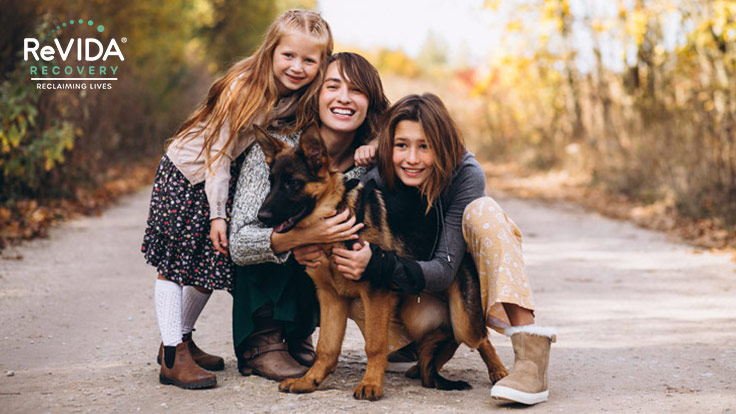
Overdose deaths are still the #1 leading cause of injury-related deaths in America, and most of those deaths are caused by opioids like Vicodin® (hydrocodone). If you or someone you love is living with a Vicodin® (hydrocodone) addiction, it’s understandable to be concerned. That being said, remember: there’s always a way to reclaim your life from opioids, and at At ReVIDA® Recovery, we can help you do that.
Table of Contents
Signs of Vicodin Addiction
Signs of addiction vary from person to person. Some people are better at hiding it than others, so it may not always be easy to identify. The person who is managing a Vicodin® (hydrocodone) addiction may not even be aware that they’re becoming dependent. Let’s talk about some common signs to look out for:
- Isolation. When someone has become dependent on opioids, they don’t want to be in a place where those opioids aren’t accessible. They may also feel shame or regret and are trying to hide that from family, friends, or coworkers. It’s also possible that the person living with dependency doesn’t want anyone to see them after they’ve taken the drug because they’re hiding the fact that they’re using it. Addiction and secrecy often go hand-in-hand because the person who is experiencing it doesn’t want others to know what they’re going through. If someone is staying home when they’d usually spend time with friends or if they’re avoiding answering the phone/interacting with others, it could be a sign of a Vicodin® (hydrocodone) addiction.
- A drop in grades or the loss of a job. Keeping up with an addiction is hard work. Opioid dependency can impair sleep, cause depression or fatigue, and oftentimes, it can consume the life of the person experiencing it. Losing a job or suddenly not doing well in school are common alongside opioid misuse, so it’s something to look out for.
- Memory disturbances or impaired judgment. Vicodin® (hydrocodone) binds to opioid receptors in the brain, changing its neural pathways and the way it’s wired. It also impairs judgment and lowers inhibitions, and sometimes this can be evident to the people around us. On top of that, if someone takes too much of this medication or if they’re taking it regularly, it could change the way they remember things. If you’re seeing behaviors you don’t normally see, it could be a sign of addiction.
- An increase in doctor’s appointments. If someone is experiencing a dependence on opioids, their tolerance is going to be high. Their regular prescriptions won’t be enough anymore, and they may resort to seeing other doctors to obtain more Vicodin® (hydrocodone). Physicians typically only prescribe opioids for a short time – and only in the event of an extreme injury and chronic pain. A doctor will not continue to prescribe it long-term unless completely necessary. This may cause an individual to seek out other doctors who are unaware of their original prescription.
While these signs are typically the most common, others can appear as well, such as:
- Pinpoint pupils
- Agitation/irritability/moodiness
- Depression
- Euphoria
- Apathy
- Attention difficulties
- Difficulty concentrating
- Cravings
- Tremors
- Insomnia
- An inability to avoid opioids – even in dangerous situations (like driving a car or caring for children)
Vicodin Addiction: Causes and Risks
Maybe you’ve heard this before, but addiction doesn’t discriminate. It can impact people from all walks of life. However, risk factors are often present when we’re talking about dependency. If you or someone you love have some of these risk factors, it’s important to be careful when taking substances like Vicodin® (hydrocodone). The National Library of Medicine has an opioid risk tool (ORT) that is designed to help adult patients in medical settings assess their risk for opioid misuse. This exists for adults who are considering prescription pain medication (for surgery or chronic pain) but aren’t sure it’s the right path for them. These are the factors they have included in their tool:
- A family history of substance use
- A history of trauma (including preadolescent sexual abuse)
- A personal history of substance use
- Someone’s age
- Mood disorders like depression or anxiety
- Mental disorders like bipolar disorder, schizophrenia, obsessive-compulsive disorder, or attention deficit disorder
Having these risk factors doesn’t mean someone will become addicted to Vicodin® (hydrocodone). What it means is that it’s important to keep an eye out for potential issues with opioid dependency. If you or someone you love has one of these risk factors, talk to your doctor before starting a medication like Vicodin® (hydrocodone).
Statistics of Vicodin Addiction
As we’ve mentioned, Vicodin® (hydrocodone) is used to treat post-surgical or severe pain. When prescribed and used as directed, this medication can not only relieve pain but speed up the healing process. It only becomes “dangerous” when it’s taken illicitly or outside of a doctor’s orders. For example, if a doctor’s prescription says 1-2 pills per day as needed for pain, but someone is taking 3+, it becomes unsafe.
Here are some surprising statistics about opioid addiction among the United States population:
- During the first year of Covid-19, overdose deaths increased by 30.6%
- Drug overdose deaths increased by almost 30% in 2020
- Nearly ½ of millennials believe it’s “easy” to obtain illicit opioids
- 79% of people who overdose on opioids are white, 10% black, and 8% Hispanic
- 1.6 million people have had an opioid use disorder within the last year
- 10.1 million people misused opioids in the last year
How Does Vicodin® (hydrocodone) Affect Mental Health?
Vicodin® (hydrocodone) changes brain chemistry, which can cause depression or anxiety. It’s also important to note that those who are regularly misusing opioids are at risk for things like isolation, which can cause poor mental health as well.
Addiction has been known to cause rifts in relationships, poor physical health, poor sleep patterns, and other life circumstances that aren’t conducive to a healthy mind. So while the drug itself may not cause poor mental health, the addiction and its side effects could be the culprit. Vicodin® (hydrocodone) also has a “come down” effect, and it can feel unpleasant or uncomfortable when it wears off. This can cause anxiety, depression, sleep disturbances, and more.
How Does Vicodin® (hydrocodone) Affect Physical Health?
Opioids directly affect many parts of the body, most notably, the gastrointestinal tract and function. When this happens, an individual can experience chronic constipation, nausea, or even bowel obstructions. Another side effect of opioid misuse is damage to the bladder and intestines which can cause issues with urinating, leading to urinary tract infections.
Vicodin® (hydrocodone) can also impact the heart, lungs, endurance, bones, and more. Someone who is misusing opioids is also at risk for injuries like falls or fractures because it causes issues with balance and atrophy. Because all opioids suppress the ability to cough, the body is unable to expel things like sinus drainage or other unhealthy environmental toxins. This can lead to issues with breathing, snoring, sleeping, and more.
Again, it’s important to note that these side effects are very rare when Vicodin® (hydrocodone) is taken for a short period under a clinician’s supervision. It’s only when it’s misused for longer periods that the chances of experiencing physical and emotional side effects become common.
Getting Treatment for Vicodin Addiction
If you or someone you love is managing an opioid use disorder, it’s not the end of your story. At ReVIDA Recovery, we help individuals reclaim their lives from opioid addiction every day. It doesn’t matter how long you’ve been taking Vicodin® (hydrocodone) or how impossible it feels to stop right now – recovery is always possible. Let’s talk about some of the Vicodin addiction treatment options we offer here that could be right for you.
Medication-Assisted Treatment (MAT)
While you’re here for MAT, you’ll be closely monitored by a compassionate and knowledgeable staff. Medications are available that can help in alleviating withdrawal symptoms and guiding you safely into recovery. You’ll also have access to resources that can help you on your journey moving forward, including individual counseling, group counseling, and support groups. In a MAT program, we use medications alongside traditional therapy to guide you away from Vicodin® (hydrocodone) and into a healthy life of recovery.
You’ll also have the option to move forward with our outpatient treatment program. If a higher level of care is warranted, we will provide referrals for a local inpatient or residential treatment program. Your clinician will go over all of your options to set you up for success.
Buprenorphine (Suboxone®) Treatment
Medication-assisted treatment, or MAT, is a safe and evidence-based way to treat OUD. At ReVIDA® Recovery, we support the use of buprenorphine (Suboxone®) because it has been proven to reduce cravings while working to prevent relapse. To receive buprenorphine (Suboxone®) treatment, you will have to be opioid-free for 24 hours.
Outpatient Rehab Services
We believe that both individual and group therapy are critical components in the treatment of OUD – especially if you’re looking for long-term recovery. This is a safe and supportive space where you will learn how to manage your triggers and create healthy coping mechanisms. Our behavioral healthcare team is composed of licensed therapists, certified counselors, care coordinators, and peer recovery specialists who are standing by and ready to help. If we can treat your addiction where it started, at its roots, your chance of recovery is greater than if we were to simply treat your Vicodin withdrawal symptoms.
At ReVIDA® Recovery, we’re standing by to help you reclaim your life from Vicodin®. Recovery is possible, and you can start your journey to wellness whenever you’re ready. To learn more or to schedule an appointment, please call us today at 423-631-0432.










